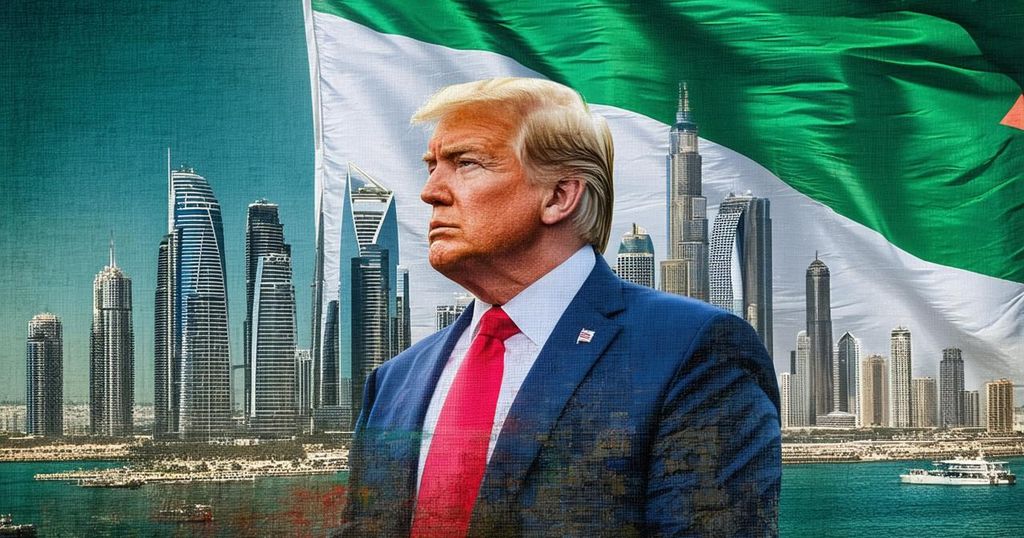Why Gulf States Favor Trump: Strategic Interests Amid Shifting Geopolitics

Saudi Arabia and the UAE are expected to support former President Donald Trump in the upcoming U.S. election due to his foreign policy, which previously bolstered their regional ambitions and security ties. In contrast, Vice President Kamala Harris is anticipated to adopt a more diplomatic approach that may not align with their interests, particularly regarding Iran. This preference underscores the strategic calculations of both Gulf states in light of their ongoing rivalry and the shifting geopolitical landscape.
Amidst escalating tensions in the Middle East generated by Israel’s conflict with Hamas, the Gulf States, particularly Saudi Arabia and the United Arab Emirates (UAE), find themselves navigating a precarious geopolitical landscape. As the United States approaches the upcoming presidential election, these nations exhibit a discernible inclination towards supporting former President Donald Trump over current Vice President Kamala Harris, the Democratic nominee. Their preference is anchored in a calculated strategic assessment, as they perceive Trump’s potential return to power as an opportunity to further advance their regional aspirations. Both Saudi Arabia and the UAE have historically benefited from Trump’s administration, which offered substantial U.S. support through arms deals and a staunch approach towards Iran. In contrast, Vice President Harris is anticipated to adopt a more cautious foreign policy, favoring diplomatic engagement with Iran, which runs counter to the Gulf States’ objectives. Harris’s approach may involve reviving Obama-era tactics that prioritize diplomacy over outright support for Gulf interests, a shift that could significantly alter the dynamics in the region. Additionally, during Trump’s previous tenure, Crown Prince Mohammed bin Salman initiated negotiations for a comprehensive security agreement with the United States, which would enhance military collaboration, including arms sales. The Crown Prince perceives that Trump’s willingness to provide unwavering support could lead to a formalized and advantageous security pact. Moreover, the evolving situation regarding Iran greatly concerns both states. Saudi Arabia, under the leadership of Crown Prince Mohammed bin Salman, views Iran as a principal regional threat and has expressed a willingness to develop a nuclear program should Iran proceed with its nuclear ambitions. Trump’s prior administration adequately addressed these fears by employing stringent measures against Tehran, thus enhancing Riyadh’s security posture. The UAE, on the other hand, seeks to maintain its security and economic advantages in the region, exemplified by its 2020 signing of the Abraham Accords under Trump, which propelled its relations with Israel into a new era of cooperation. Nevertheless, the Biden administration’s concerns surrounding human rights issues and regional conflicts, such as in Yemen, have led to delays in essential arms deals, including a proposed F-35 sale to the UAE. Under a potential Trump presidency, the UAE anticipates a continuation of a more lenient approach towards its regional ambitions without rigorous scrutiny from the U.S. In conclusion, the Gulf States’ preference for Trump over Harris reflects their desire for a U.S. foreign policy that aligns closely with their strategic objectives in a tumultuous region. However, their growing rivalry with each other, amid U.S. preferential treatment, presents a delicate balancing act within Gulf dynamics. The possible outcomes hinge not only on U.S. electoral decisions but also on the ongoing geopolitical developments within the Middle East.
The Gulf States, particularly Saudi Arabia and the UAE, have been assessing their foreign policy alignments in light of the evolving geopolitical landscape shaped by conflicts such as the war between Israel and Hamas, as well as U.S. electoral politics. Trump’s past administration provided these states with unprecedented support, especially concerning arms deals and security alignments against Iran, which informed their strategic preferences as the election approaches. The potential return of Trump is viewed as advantageous to the Gulf’s long-term military and economic ambitions, contrasting sharply with the anticipated approach of Vice President Harris, who may prioritize diplomatic engagement over militaristic support.
In summary, the Gulf States, driven by their ambitions for security and regional dominance, are likely to favor a return of Donald Trump to the White House over Kamala Harris. Their calculations are influenced by Trump’s demonstrated willingness to support their geopolitical interests without significant constraints. Nevertheless, the existing rivalry between Saudi Arabia and the UAE, coupled with the implications of a potential Trump presidency, could lead to a nuanced and complex play of power dynamics in the region moving forward.
Original Source: foreignpolicy.com








